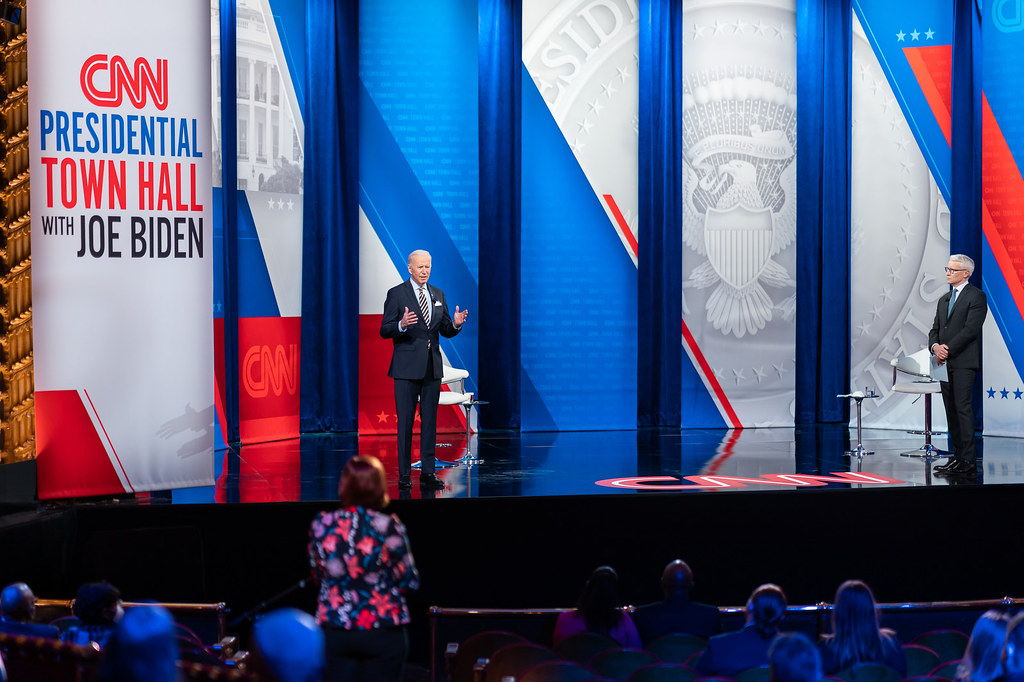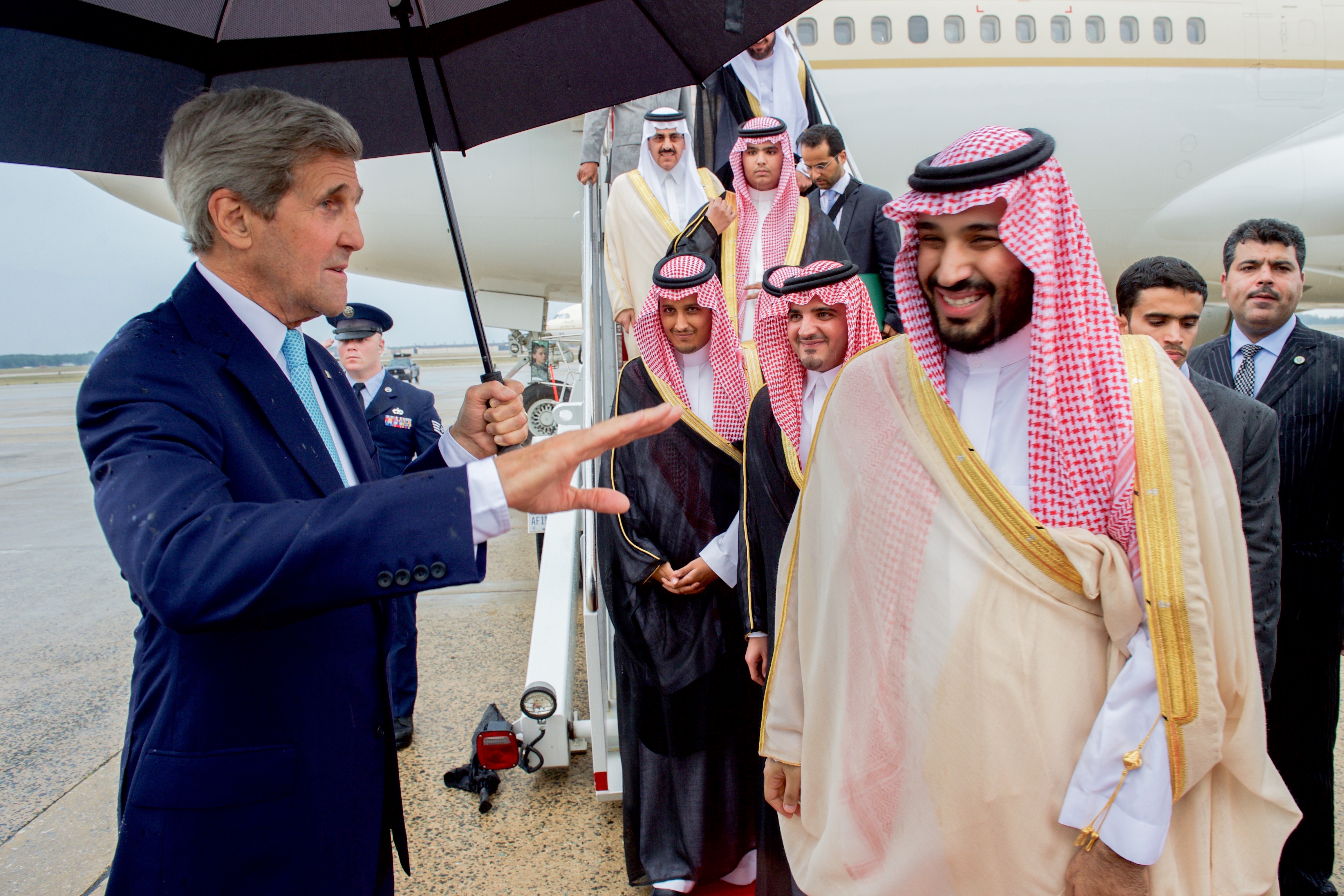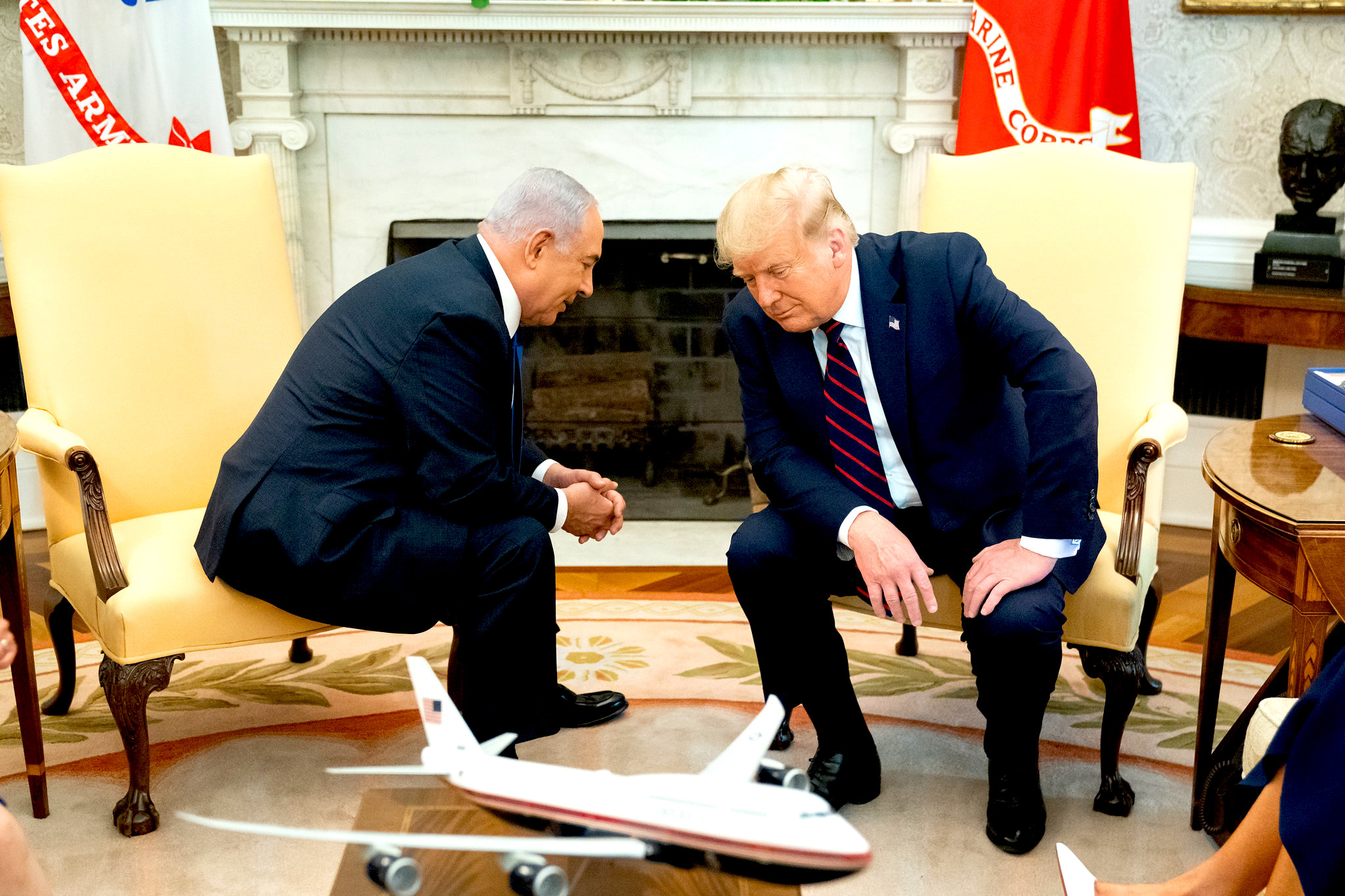From Iran to Yemen, As`ad AbuKhalil summarizes the bipartisan consistency with which Israeli interests dominate in U.S. foreign policy.

President Joe Biden participates in a CNN Town Hall with Anderson Cooper, Feb. 16, in Milwaukee, Wisconsin. (White House, Adam Schultz)
By As`ad AbuKhalil
Special to Consortium News
 During the last presidential campaign, Joe Biden and his supporters raised high expectations about the impact his victory would have on foreign policy. U.S. and European mainstream media — which all but campaigned vigorously for Biden — made a fuss about former President Donald Trump’s penchant for alliance with despots. The previous president was often mocked for his close relations with Egyptian and Saudi leaders for example (of course, he was never mocked for his closeness to Israeli Prime Minister Benjamin Netanyahu because Western media don’t mind the Israeli occupation and aggression).
During the last presidential campaign, Joe Biden and his supporters raised high expectations about the impact his victory would have on foreign policy. U.S. and European mainstream media — which all but campaigned vigorously for Biden — made a fuss about former President Donald Trump’s penchant for alliance with despots. The previous president was often mocked for his close relations with Egyptian and Saudi leaders for example (of course, he was never mocked for his closeness to Israeli Prime Minister Benjamin Netanyahu because Western media don’t mind the Israeli occupation and aggression).
These media left the impression that Trump was the first U.S. president to coddle dictators in the Middle East and beyond. The media — uncharacteristically — turned the murder of Jamal Khashoggi into a cause celebre and made taking action against the Saudi Crown Prince Muhammad Bin Salman, or MbS, for ordering the killing of The Washington Post columnist, a primary foreign policy issue. It was raised repeatedly in the campaign and even in presidential debates and press interviews. Biden volunteered that MbS had no redeeming quality and — for the first time in U.S.-Saudi relations — declared the Saudi regime a “pariah.”
It would not be the first time a U.S. presidential candidate would backtrack on U.S. policy toward Saudi Arabia.
Barack Obama, Trump and John Kerry all threatened Saudi Arabia with various reprisals if they were elected. The reality is by now well known.
Kerry, as Obama’s secretary of state, enjoyed close relations with the Saudi regime and even hosted MbS in his home in D.C. We were told at the time that Kerry was impressed that a Saudi prince could play the piano.
U.S. foreign policy is too deeply entrenched with imperialist interests to be easily altered by new presidents, even if they are genuinely interested in reorienting foreign policy — in the Middle East primarily, or anywhere.

U.S. Secretary of State John Kerry at left with Deputy Crown Prince Mohammad bin Salman, 2015. (State Department)
After several months of the Biden administration, it is becoming clear that the new administration is not that different from the Trump administration, as far as U.S. foreign policy in the Middle East is concerned. Almost all of the Trump initiatives are being kept intact.
Israel: The U.S. has preserved the relocation of its embassy from occupied Jaffa (“Tel Aviv”) to occupied Jerusalem, and major construction is underway in Jerusalem for it. Biden may inaugurate the new embassy, which would officially and juridically seal U.S. recognition of Israeli occupation of Jerusalem, thereby putting a nail on the coffin of the “two-state solution.” The U.S. has also not voiced criticism of the major expansion of Jewish settlements in the West Bank, and Secretary of State Antony Blinken has not reversed Trump’s official recognition of the Israeli occupation of the Golan Heights. Furthermore, the Biden administration is as pleased with Arab despotic rapprochement with Israel as Trump was. In fact, MbS may find that the closet way to Biden’s heart, and even to the hearts of liberal media, is through a peace treaty with Israel.

Netanyahu, left, and Trump meeting on Sept. 15, 2020 in the Oval Office. (White House, Andrea Hanks)
Syria: The Biden administration maintains the cruel U.S. sanctions on Syria, which are hurting the Syrian population — whether or not they are pro-regime. U.S. sanctions never affect the lifestyle and livelihood of rulers but they always hurt the average people. Since my arrival in the U.S. in 1983, the U.S. has only invoked the welfare of a population under U.S. sanctions when the Reagan administration resisted pressures to impose sanctions on apartheid South Africa. The U.S., out of support for the apartheid regime, claimed that sanctions could hurt the civilian population there.

Syrian women and children refugees at Budapest railway station, September 2015. (Mstyslav Chernov, CC BY-SA 4.0, Wikimedia Commons)
But the U.S., in all of its sanctions against Arab and Muslim countries, never once invoked the welfare of the people — precisely because the lives of Arabs and Muslims are not equivalent in U.S. eyes to the lives of white settlers in South Africa.
The U.S. has also refused to reduce U.S. or Israeli bombing in Syria, perhaps because it wants to extract a peace treaty with Israel from any (current or future) government in Damascus. The U.S. wants the Syrian regime and its opponents to understand that Washington won’t allow a political settlement without taking into consideration Israeli “security interests” and U.S. hegemonic interests.
“The lives of Arabs and Muslims are not equivalent in U.S. eyes to the lives of white settlers in South Africa.”
The Biden administration has continued to keep U.S. troops in Syria and may increase their numbers. The U.S. does not hide its true intentions: that the troops are there to counter Israel’s enemies, not to deal with a non-existent threat from ISIS.
Yemen: The U.S.-Saudi war on Yemen continues unabated and the Saudi regime resumed its raids over Yemen. The Biden administration has suspended the export of what it termed “offensive weapons” to Saudi Arabia but it continues to supply “defensive weapons.” After declaring the Saudi regime a “pariah” state in the campaign, Biden administration officials — widely covered in Saudi regime media — have been declaring their support for the “defense of Saudi Arabia” — which means the Saudi regime and the rule of MbS.
While the Biden administration has been vocal in support of the Saudi regime when its oil refineries come under attack from Houthi missiles, it has not once condemned Saudi bombing of Yemen and the suffering of the Yemeni civilian population it has caused. The U.S. has also endorsed a Saudi so-called peace plan for Yemen, which lacks the basic element for peace, which would include the lifting of cruel sanctions. (In the Saudi plan, the regime brazenly pledges that it will allow food shipments into Hudaydah airport, thereby confirming that it has been denying food and medical necessities from the people of Yemen). But this is not just a Saudi war; it is a Saudi-UAE war with full Western and Israeli backing.
Iraq: Like the Trump administration, the Biden administration refuses to heed the demands of the Iraqi people through their representatives who voted overwhelmingly for U.S. troops to leave the country. The Biden administration is even keener on keeping U.S. troops in Syria and Iraq. Current officials are among those who protested when Trump sought the withdrawal of U.S. troops.

Speaker of Iraqi Parliament concluding Jan. 5 vote on expelling U.S. troops. (YouTube still)
Moreover, the Biden administration is, yet again, exaggerating the threat of ISIS to justify the permanent presence of U.S. troops in Iraq and Syria. At least the Trump administration was honest in admitting that U.S. troops in Syria were more about fighting Israel’s enemies than about fighting ISIS, as Trump said, for the oil. (As is well-known, Al-Qa`idah and ISIS have consistently avoided attacking or even antagonizing Israel.)
Iran: The White House has continued the path of Trump’s administration in tightening the grinding sanctions on the Iranian people. Worse, the Biden crew has basically absolved the Trump administration for causing the collapse of the nuclear agreement. The new Democratic team has basically internalized the stance of Trump, who insisted — despite evidence to the contrary — that Iran was violating the agreement before the U.S. decided to violate it (even though the agreement was integrated into international law as soon as it was adopted by the UN Security Council).
The U.S. still refuses to lift the sanctions, although the reimposition of U.S. sanctions was what caused Iran’s gradual abandonment of the terms of the agreement. The Biden administration is not only refusing to take the first and logical step to return to the agreement, but is signaling that it will impose new conditions on Iran (regarding ballistic missiles), in violation of the terms of the original agreement.
In sum, the mainstream liberal media widely exaggerated the extent to which the Biden administration would deviate from the path of Trump’s foreign policy innovations.
In the case of Israel, it was inevitable that the new administration would not dare retract some of the unprecedented steps that Trump made toward Israel, or that Biden — like all previous U.S. presidents — would continue to embrace despots in the Middle East and beyond.
But beyond that, on more than one issue and in more than one country, the Biden administration has followed in the footsteps of Trump, just as Obama before him followed in the footsteps of the Bush administration. Bipartisanship in foreign policy is still alive and well, no matter how much havoc this consensus brings to the people of the world.
As`ad AbuKhalil is a Lebanese-American professor of political science at California State University, Stanislaus. He is the author of the “Historical Dictionary of Lebanon” (1998), “Bin Laden, Islam and America’s New War on Terrorism (2002), and “The Battle for Saudi Arabia” (2004). He tweets as @asadabukhalil
The views expressed are solely those of the author and may or may not reflect those of Consortium News.



Im so happy the angry arab is sound and alive, mis your everyday comments about the middle east
It is almost as if unaccountable and illegitimate oligarchs run US foreign policy and the citizens are conned into believing their votes make a difference merely to appease them and for media ratings. (/S)
I fully agree with the above statement by Deniz with the exception of one thing: the word “almost.” That word does not belong there at all.
Right. Deniz’s sentence should read “The fact is unaccountable and illegitimate oligarchs run US foreign policy and the citizens are conned into believing their votes make a difference merely to appease them and for media ratings.”
Helga is correct, the word “almost’ should be dropped and the word ‘totally’ be placed just after “oligarchs”.
It is about the money and always has been. The way I see it James Jesus Angleton’s highly suspect very close relationship with the Israeli right included a deal CIA made unauthorized by other government officials. And the U.S. government and CIA compromised U.S. sovereignty by looking the other way.
The U.S. government and CIA got taken to the cleaners, not only did Israel get help with their nukes, Israel got locked into a position of power in that they have CIA and the top officials on U.S. government compromised also.
Imagine the US public learning that CIA happily handed over SPECIAL NUCLEAR MATERIALS TO ISRAEL. The DOJ has allowed Israel a free hand in organizing their AIPAC lobby which now wields undue authority in the U.S. congress. This freedom for Israel to interfere in U.S. foreign policy is heresy to the US Constitution.
Israel by achieving the NUMEC project also achieved the ability to engage in “Nuclear blackmail” of CIA.
By now it is widely excepted that Israel received assistance from individuals inside the United States Atomic Energy Commission, quite possibly from members of the Army Corp of Engineers , high ranking Zionist supporters, of whom former potus Harry Truman was one.
But please don’t take my word for it see Roger J Mattson’s “STEALING THE ATOMIC, HOW DENIAL AND DECEPTION ARMED ISRAEL. Mattson should have as good an idea about where the skeletons are hidden as any one given his former service to the USAEC. Read the book he knows!
Now say it with me, the Deep State is international and directs CIA policy. The Deep State represent the 1% world wide and as Dr. Hudson predicts when they have finished draining U.S. of capital it will be thrown out of the limo to the curb.
So Jawed Sheikh, the Deep State controls policy for the White House, especially foreign policy because that is where the real money is to be found. Something Robert Blum and Alan Dulles made sure of by having CIA made in the model they wanted which included using private donations to run CIA black ops. See Jane Mayers Dark Money ” book and learn about Blums efforts through foundations prior to U.S.AID being established.
JFK was going to stop CIA in it’s tracks and ee see where that got him.
To Buffalo Ken: Sir you are correct our treatment of Israel make no “effing sense”, that is until one ponders the unthinkable. The unthinkable being that very early on Israeli interests had a very significant inside track at the USAEC and it is very likely that JJ Angleton had been compromised by Israel before or soon after he became the “Head” of the Israeli desk at CIA. He lied about knowing about NUMEC and he lied about knowing about Lee Harvey Oswald. And as head of counter intelligence he never caught a spy.
But why does, as you say, it makes no effing sense, or does it make complete sense? To be completely honest with ya’ll when I read what Micheal Hudson has to say about bankers, their recent history since around 1939 and their level of sophistication I see this picture all too clearly.
Figure it out kids!
Thanks CN
PEACE
Very well articulated article. US policies never change under any administration. Their policies are totally flawed from one viewpoint only. Never taking ground realities into consideration.
Very good observations. But did anyone really expect things to be different? It’s coke or Pepsi, tweedledum or tweedledee.
BTW, in USA you can change the party but not the policy. In China you cannot change the party but the policy.
China, Russia and Iran are coming together—and the US is falling apart. It’s sad to have a government that doesn’t seem to believe in democracy—although I’m not sure what the government believes in. Maybe because America was the only one left standing- after WW II– I guess America still thinks that it’s number 1 in the world. If we didn’t have such a huge Jabba the Hutt military—-what a wonderful place America could be for so many. 800 bases does seem a bit insane in a world that really can’t afford so many wars—and neither can the planet.
Imperialism is bipartisan. The Democrats are not the left, because the real left is uncompromisingly anti-imperialist.
For all Trumps faults & crass, uncouth behaviour, at least he pulled off the fake, benevolent mask that the US Empire likes to wear to reveal the murderous, despotic & rotten face behind the mask & it’s true, evil intentions? America protects Israel because of its prominence in the Bible & believes if it protects Israel, it will receive divine approval? America gets on so well with despots, Dictators & Tyrants because it is the King of despotism? As long as these despots or any other approved US Tyrant, such as Netanyahu or MBS serve American interests, they get America’s papal blessing? It really doesn’t matter what POTUS, Leader or Party is in charge of the US, whether it’s the idiotic Leadership of Trump or the dementia ridden Biden, this genocidal Country has a united, Party objective & that is America must dominate & rule & everyone else must bow down & obey its dictates or else be destroyed? The lunacy of this racist, white supremacy, white privileged dominated agenda is that any Nation that refuses to abide by this demented mentality is viewed as a nail that must be bashed down by a America hammer? The saving grace is that the American Empire is in massive decline & collapse with a rising Superpower in China & a confident Russia, forming a unbreakable alliance to counter & resist America’s malign influence? The irresistible, but failing American force has met a immovable object in the Alliance of China & Russia? The USA’s failure to acknowledge that it’s unipolar moment has passed is as sad as it’s inevitable collapse but no one will miss a Tyrant run Nation when it eventually dies!
They also support (and FUND) the horrendous regime that stole Palestine (all of it) from the indigenous population of Palestinians because of all of the corrupting slushing of $$$$$$$ that many with links to those in what was Palestine use to buy the ends they want…
Thanks As`ad AbuKhalil for this great piece. US foreign policy will manifest failure in the upcoming decades. The sooner the US can realize that its Iran policy as it exists today, will not accomplish anything meaningful despite the influence of Saudi Arabia, Israel and the Gulf States to the contrary. As far as Iraq, the US unintentionally relinquished it’s position during the 2003 invasion and deposing Saddam in the aftermath.
Thanks As`ad AbuKhalil for this great piece. US foreign policy will manifest failure in the upcoming decades. The sooner the US can realize that it’s Iran policy as it exists today, will not accomplish anything meaningful despite the influence of Saudi Arabia, Israel and the Gulf States to the contrary.
Thanks to the Angry Arab, and everyone who really gets down to the facts as he has, would surely understand that Biden and “top diplomat” Blinken are just holograms of the dreaded Trump régime being treated as if they are ready to introduce some fairness into the USA’s “rules-based” foreign policy.
Who can blame an “Arab for being Angry”. Not me. I would be as well. I am angry about the Middle East and I’m not even an Arab.
~
Israel’s agenda, nay, the agenda of Israel’s leaders and lofty supporters seems to be endless misery for so many and being how misery has a tendency to spread, I wonder if the misery will come home to roost? I understand the claims made by the “leaders” in the US of a as to why they felt “it was in the national interst” to have a presence so far away from home, but I just think they have always been rationalizations and that at one time somebody might have swallowed them, but they just make no damn sense especially as time has progressed. It is a meaningless waste and causes so much suffering of innocence. It makes no effing sense – none whatsoever.
~
I don’t think Israel’s leaders and lofty supporters are really friends/allies of the US of A. Not for most of the citizens of US of a nor for most of the citizens of Israel I’d suggest. Most of us just want to get by day-by-day. I hope something changes, but when is the last time there were changes for the better for the Palestinians for example? No wonder there is anger and I think it is justified. I think discriminate justified retribution is called for and I call for it.
~
BK
I advocate non-violence and direct action – it is the only way to achieve peace
Quite…And you’ll have noted throughout the past 70+ years, NOT once has the zionist ethnic cleansing (all too often violent, murderous) and its continuing bulldozing of Palestinian homes, destruction of their few remaining farms, olive groves, the “Jewish” Israeli ONLY roadways in the west Bank, the repeated bombing of Gazan Palestinians (so many the ethnically cleansed Palestinians or their descendants)…supposedly in response to the occasional, rarely if ever, dangerous big firework that Hamas sends over (to my knowledge Hamas has no air force, no army and no navy, no bombers with phosphorus or TNT bombs, no tanks with missiles, no nukes) The shooting to death by IDF snipers of hundreds – including many children – through 2019 and the Gazan Palestinians peaceful protests (OK there were a handful of lads who would use stones in slingshots…right, they’re the equivalent to a sniper with an assault rifle…sarc) NEVER has any of this ANY of it been called out as Profound Human Rights Abuses, War Crimes – certainly not by a single US admin/Congress nor UK or any NATO govt….So bloody clear that the lives of darker hued peoples of Middle Eastern and North African origin do NOT matter as much as those pale skinned folks of Eastern European origin…
In keeping with the theme, the Biden foreign policy towards Russia and China also appears to be similar to Trumps. Sanctions, threats and a non-stop support of the propaganda narrative that both countries are trying to destroy American democracy at home and America’s policies abroad (as the US defines human rights, free trade, freedom of navigation, etc.).